×
The Standard e-Paper
Kenya’s Boldest Voice

I learnt of Catherine Kasavuli's battle with cervical cancer with a lot of apprehension. I think we - the audience that spend years adoring personalities like Ms Kasavuli - never quite expect such news.
As a doctor though I have a good grasp of man's susceptibility to ill health. In Kenya, cervical cancer is the leading cause of cancer deaths amongst women. I handle hundreds of cervical cancer patients at Texas Cancer Centre. So, I know that cervical cancer can affect any woman; even celebrities.